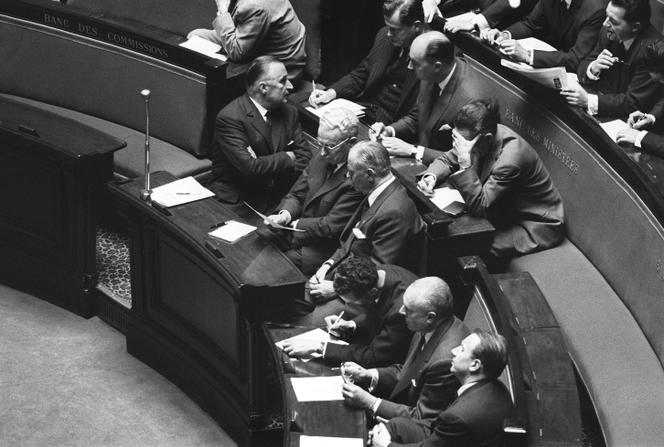


It was 4:42 am on Friday, October 5, 1962. French lawmakers in the Assemblée Nationale had been passionately debating the motion of no confidence tabled against Georges Pompidou's government since the previous afternoon. "Conspiracy" "deception" "plotting," the most damaging words were thrown. Then came the vote, in the middle of the night. And then it was time to count the votes. "The majority required to pass the motion of no confidence is 241," announced Gaullist Jacques Chaban-Delmas, who chaired the meeting. "Votes for adoption: 280. The motion of no confidence is therefore adopted."
Never before had these words resounded in the Assemblée since the establishment of the Fifth Republic. Never have they been heard again. Since 1958, nearly 150 motions of no confidence have been tabled. Only one was successful, in October 1962.
The story of the 1962 motion of no confidence is that of a fleeting success, which quickly turned into an implacable failure for its initiators. It all began on August 22, 1962, on a suburban road. In Clamart, a suburb southwest of Paris, the car taking Charles de Gaulle to Villacoublay airport with his wife and son-in-law was suddenly machine-gunned by several attackers. Some 150 bullets were fired at the president. No one was hit. However, this failed assassination attempt by a supporter of French Algeria accelerated de Gaulle's plans.
To consolidate the political system he had established four years earlier, and whose fragility this assassination attempt demonstrated in his eyes, the former Resistance fighter announced a reform of the Constitution one month later, on September 20. He proposed that the French president should no longer be elected by a college, but by direct universal suffrage, and decided to submit this amendment to the French people in a referendum.
This caused an uproar among members of parliament, who felt they had been circumvented, especially as a number of legal experts challenged the procedure. Above all, elected representatives rejected the idea of strengthening the electoral base of the president, and thus his power, in such a way as to suddenly alter the balance of institutions. On October 4, radical, independent, Socialist and Christian Democrat MPs tabled a joint motion of no confidence.
In the Assemblée, former cabinet president Paul Reynaud, who had just broken with de Gaulle, sounded the charge against the reform. It would make the president "all-powerful," but "accountable to no one," he argued: "He could dismiss the Assemblée "as he pleased," and his ministers would play only "the role which, at the French court, was that of the minions who were whipped when the dauphin to the throne did something foolish." Such a regime would be "extravagant" as well as "dangerous," he claimed.
You have 41.68% of this article left to read. The rest is for subscribers only.
